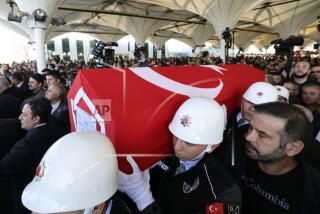Kurd’s Insurgency Is a Thorn in Turkey’s Side
- Share via
SIRNAK, Turkey — Ali Khan Tatar keeps a pistol by his side. So do his brothers, cousins and dozens more clan members defending their bullet-chipped family compound--virtually a hilltop fortress.
Members of the Kurdish Tatar clan reckon they are the only local people who still support the Turkish government in the Sirnak area, 600 miles southeast of Ankara.
“Ninety-five percent of the people here support the PKK (Kurdish Workers Party rebels),” said Ali Khan, the clan’s Aqa, or leader. “And we are the PKK’s No. 1 target here.”
Five years after it launched an armed struggle for an independent state, the Kurdish Workers Party scores few big guerrilla victories and brings no marchers or stone-throwers onto the streets. But in the sparsely populated mountain ranges around Sirnak, the current center of the insurgency, its guerrilla bands are a constant thorn in Turkey’s side.
No Quick Solutions
“I don’t see any quick solutions to this problem,” said one senior local official. “The PKK may be crazy but it is tough, a kind of would-be Kurdish Khmer Rouge.”
At least 1,500 people have been killed since the PKK launched its armed struggle for an independent Kurdish state in August, 1984.
Most of those killed are civilians and Turkey’s official press alleges that the PKK murders opponents and their families, including babies.
For their part, local villagers complain bitterly of excesses by troops and the Tatar clan’s government-armed “village guards” militia.
“In my opinion, the reason this problem is still going on is that there is not enough torture,” Ali Khan said calmly.
‘Terrorist Tool’
Turkish officials also see the PKK, led by Abdallah Ocalan, an Ankara University political science dropout, as a “terrorist tool” of neighboring Syria.
But a Turkish diplomat said Syria had restrained the PKK since Prime Minister Turgut Ozal visited Damascus in 1987 and made it clear that Turkey would tolerate no more internal interference.
PKK bases were moved away from the Turkish border but the party still has bases in Lebanon’s Syrian-controlled Bekaa Valley.
Syria fears that huge dam projects in Turkey will cut its vital supplies of Euphrates River water, already a fifth of agreed levels because of a continuing drought in Turkey, the Turkish diplomat said.
“Syria knows terrorism is the only ace up its sleeve against Turkey, and Turkey is trying to keep it as far up that sleeve as possible,” a Western diplomat said.
Series of Setbacks
Syrian restraint is only one of a series of setbacks for the PKK in the last two years. Its field force along the border with Iraq is now mostly made up of ill-trained youths, many taken in their early teens in forced levies from villages, according to Turkish officials and Kurdish sources.
The PKK can now operate freely only along the Iraqi border, an area called the “Botan Triangle” centered on Sirnak and reaching to Cizre, Siirt and Hakkari.
Many of its experienced commanders were captured or have surrendered in the past year, the officials and sources say.
The PKK is beyond the pale even to some other groups representing the Kurds, a people whose traditional Kurdistan homeland straddles Turkey, Iraq, Iran and Syria. Kurdish nationalist sources say their people number 20 to 30 million.
Ocalan, whose name means “revenge taker,” is still the major guerrilla leader, although he is not known to operate in Turkey.
Place of Pilgrimage
The grave near Sirnak of a PKK guerrilla girl killed in 1987 is now a place of pilgrimage. Its dust is even recommended by Kurdish religious elders as a cure for rheumatism.
The mountain ranges around Sirnak are excellent guerrilla country, covered in shrub and riddled with caves. Bands of several hundred PKK guerrillas have little trouble evading 10,000 to 15,000 troops ranged against them.
Local officials say the recent transfer of special army commando teams to Sirnak may not bring quick results.
“They need special training for this mountain work. The Turkish army is so conservative it will not even consider changing the heavy standard boots,” one official said.
PKK attacks have kept the Kurdish question on the agenda in Turkey and are partly responsible, diplomats say, for an informal relaxation of bans on manifestations of Kurdish culture even though the Kurds are still not recognized as a minority.
“The PKK cannot go anywhere it likes any more,” wrote Milliyet newspaper commentator Mehmet Ali Birand.
“But the (Kurdish) problem is basic. The organization’s strength is the support given by an unhappy people, whether from fear or from their hearts.”
More to Read
Sign up for Essential California
The most important California stories and recommendations in your inbox every morning.
You may occasionally receive promotional content from the Los Angeles Times.












